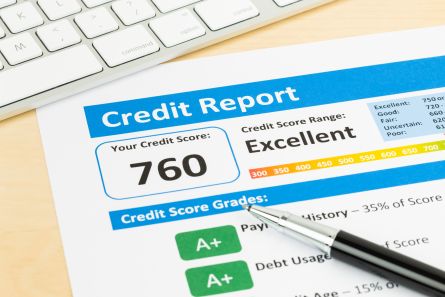
CommonCentsMom.com is advertiser-supported: we may earn compensation from the products and offers mentioned in this article. However, any expressed opinions are our own and aren't influenced by compensation. The contents of the CommonCentsMom.com website, such as text, graphics, images, and other material contained on this site (“Content”) are for informational purposes only. The Content is not intended to be a substitute for professional financial or legal advice. Always seek the advice of your Financial Advisor, CPA and Lawyer with any questions you may have regarding your situation. Never disregard professional advice or delay in seeking it because of something you have read on this website!
Disputing a credit report can be a difficult and time-consuming process, but it is possible to do so if there is incorrect or inaccurate information contained within the report.
If you believe that your credit report contains inaccurate or erroneous information, you can begin the dispute process by contacting the credit reporting agency that compiled the report. By doing this, you may be able to have the information in your report corrected.
If you are unable to resolve the dispute with the credit reporting agency, you may wish to consider filing a complaint with the Federal Trade Commission (FTC). The FTC can help you determine if any actions were taken based on the incorrect or inaccurate information in your report. Aside from that, this article will provide you with some tips on how to dispute a credit report.
How do I dispute a credit report?
The first step in disputing a credit report is to contact the credit reporting agency that compiled the report. This agency will be able to provide you with instructions on how to dispute the information in your report.
After that, you may wish to consider filing a complaint with the Federal Trade Commission (FTC). The FTC can help you determine if any actions were taken based on the incorrect or inaccurate information in your report.
Once you’re done with these steps, you may still have some additional steps to take. For example, you may want to consider requesting a copy of your credit report from the credit reporting agency. This will allow you to have a copy of the report that you can use to support your dispute.
Overall, disputing a credit report can be a difficult and time-consuming process, but it is possible to do so if there is incorrect or inaccurate information contained within the report.
How does the credit reporting agency get my information?
Credit reporting agencies get your information from a variety of sources, including credit bureaus, lenders, and public records. In credit bureaus, your information is typically pulled from your credit report and used to provide you with a credit score.
Lenders may also pull your information when they review your application for a loan. Public records can include information about your bankruptcy, judgments, and liens. For lenders, credit reporting agencies may also collect information about your debt history.
This information can be used to determine whether you are a good credit risk. Meanwhile in public records, your name, address, and other information may be available without your consent.
All of these sources of information can contribute to the accuracy of your credit report. However, if you believe that there is inaccurate or erroneous information in your report, you should contact the credit reporting agency to have the information corrected.

Will disputing my credit report make a difference?
There is no one answer to this question. Ultimately, the decision whether or not to dispute your credit report will depend on a variety of factors, including the accuracy of the information in your report and your credit history.
The accuracy of your credit report is important because it can impact your ability to get a loan, get approved for a loan, and even get a mortgage. Meanwhile, your credit history is important because it can determine your interest rate and the terms of your loan.
If you dispute the information in your report, it may take some time for the credit reporting agency to investigate the allegations and make any changes to your report.
In short, disputing your credit report may not make a big difference right away, but it could have a significant impact down the road.
Should I contact the credit reporting agency if I dispute the information in my report?
It depends. If you believe that the information in your report is incorrect or inaccurate, you should contact the credit reporting agency to have the information corrected.
However, if you only have questions or concerns about the accuracy of your report, you may not need to contact the credit reporting agency. Instead, you may want to consider contacting your bank, lender, or other financial institution to inquire about your credit score.
Likewise, if you dispute the information in your report but do not believe that it is inaccurate, you may choose to keep the dispute confidential. In this case, you can simply let the credit reporting agency know that you have disputed the information but do not want it to be included in your report.
Overall, it is important to weigh all of your options before deciding whether or not to contact the credit reporting agency. Depending on the situation, contacting the credit reporting agency may or may not be necessary.
How does the credit reporting agency respond to a dispute?
The credit reporting agency will investigate the allegations made in the dispute and may make changes to your report based on the results of the investigation. Meanwhile, you may be able to receive a copy of your report with the corrected information.
If you are not satisfied with the changes that were made, you may wish to file a complaint with the FTC. Overall, disputing a credit report can be a difficult and time-consuming process, but it is possible to do so if there is incorrect or inaccurate information contained within the report.
Inaccurate information in your credit report can have a significant impact on your ability to get a loan, get approved for a loan, and even get a mortgage. This is because the accuracy of your credit report is important for a number of reasons, including your credit score and your history with lenders.
So keep in mind that disputing your credit report may not make a big difference right away, but it could have a significant impact down the road. Meanwhile, you can follow the instructions provided by the credit reporting agency to dispute the information in your report.
Make sure to provide as much information as possible when filing a dispute, as this will help the credit reporting agency to investigate the allegations made. Additionally, you may wish to consider contacting the FTC if you are not satisfied with the response from the credit reporting agency.






